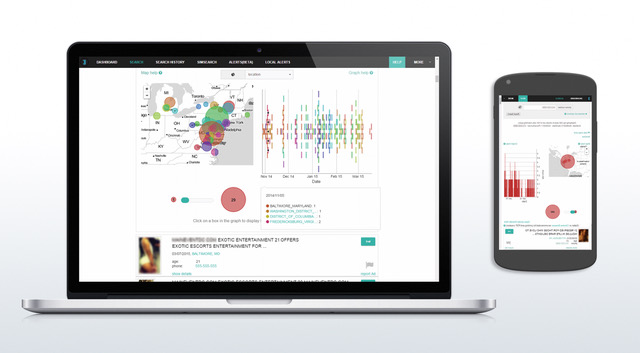A four-year pitch competition? When the grand prize is $3 million, it’s definitely worth the wait.
Pittsburgh’s Marinus Analytics, founded in 2014, registered for the inaugural AI XPRIZE in 2016. The nonprofit XPRIZE foundation provides big money for big ideas and has sponsored contests that spurred advancement in the fields of spaceflight, water purification, adult literacy, and more.
Marinus has been celebrated for developing AI tools used by law enforcement agencies to track down missing and exploited people. In 2018 alone, its technology was used to identify some 3,000 victims of sex trafficking.
“It’s a wonderful feeling to know that it’s making a difference,” company president Emily Kennedy said. And while they have had numerous opportunities to pivot to “more lucrative, less impactful work,” she said she and CEO Cara Jones remain “mission-driven.”
“We’re not going to add something to our plate unless it can make a real impact,” she said.
Kennedy first started to develop Traffic Jam, Marinus’ flagship software suite, as part of her undergraduate thesis at Carnegie Mellon University.
Here’s how it works: Traffic Jam relies on a suite of tools, including facial recognition, to scan advertisements for sexual services and cross-reference them with posters of missing people. To date, Traffic Jam is used by more than 200 law enforcement agencies across the United States, Canada, and the United Kingdom, and Kennedy said they are in the process of expanding across Europe, as well.
“The goal is [to] make it available to the larger, ‘three-letter’ agencies that everybody has heard of, but also make it available to the small police departments who might not normally have access to AI and make it something that they can fit into their organizational workflow,” Kennedy said.
Ten AI XPRIZE semifinalists were announced in January (including fellow Pittsburgh startup CleanRobotics). Three finalists will be announced soon and will pitch at TED2020 in Vancouver, British Columbia, this July, where the first-, second-, and third-place teams will be awarded $3 million, $1 million, and $500,000, respectively, as determined by audience vote.
To date, Marinus has not relied on any traditional venture capital funding. The company started with a DARPA contract as a subcontractor of Carnegie Mellon and has accepted grants from the National Science Foundation as well as money from pitch competitions like Pittsburgh’s UpPrize, from which they received $200,000 in 2015.
Regardless of the outcome of XPRIZE, Marinus is beginning to transition to work outside the scope of Traffic Jam.
Last year, Marinus began work on a contract from the Allegheny County Department of Human Services to help them make sense of unstructured data. Social workers have thousands of pages of case notes, Kennedy said, that can be analyzed through digital tools to highlight which cases need the most attention based on keywords and other metrics.
If the tool Marinus develops addresses the department’s requirements, Kennedy hopes to market the product to agencies with similar needs in the future.
Kennedy added that Marinus is also conducting some early research projects centered around the opioid epidemic. “We apply AI to help law enforcement track the sale of opioids, opioid precursors, and other hard drugs online, to prevent the ensnarement of future victims,” according to Marinus’ website.
Kennedy said that all of their latest pursuits were inspired by the lessons learned in collaboration with law enforcement agencies using Traffic Jam.
“We decided to open it up into new realms simply because in doing this work with sex-trafficking investigations and agencies, we started to see that they had a lot of other similar, kind of tangential issues where they had a lot of data, but they did not have the ability to make good use of it,” Kennedy said.
As Marinus expands its AI tools to law enforcement agencies, Kennedy is confident that he company can continue to produce “AI for good” — a common mantra of hers — by stressing education for law enforcement officers using Marinus products and engaging third-party ethicists to provide input on her company’s services.
“I would definitely say it’s always a work in progress.”
Though Kennedy lives in Denver, Marinus remains based on Pittsburgh’s North Side. The Carnegie Mellon grad said that the traditional Silicon Valley culture — raise money, scale, and exit — never fit Marinus, adding that she and Jones think it’s essential to grow a small business “slowly, sustainably, and deliberately.”
“Pittsburgh has such a thriving startup culture, and I’ve always viewed us as a Pittsburgh company, because to me, being from Pittsburgh means being hard-working, having grit, and the ability to stick with something long enough to see the fruits of your labor.”
Before you go...
Please consider supporting Technical.ly to keep our independent journalism strong. Unlike most business-focused media outlets, we don’t have a paywall. Instead, we count on your personal and organizational support.
Join our growing Slack community
Join 5,000 tech professionals and entrepreneurs in our community Slack today!

The person charged in the UnitedHealthcare CEO shooting had a ton of tech connections

From rejection to innovation: How I built a tool to beat AI hiring algorithms at their own game

The billion-dollar creator industry hits Pittsburgh — and disrupts the innovation economy


